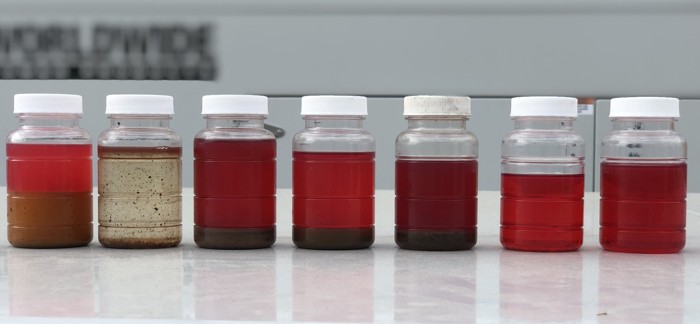How to Effectively Clean Diesel with Fuel Polishing
One of the most common concerns with deploying a diesel generator is fuel storage – over the long-term, effective storage presents a unique set of challenges. While you might be tempted to stock up or to leave a full tank sitting for an extended period of time, the risk of contamination becomes much greater the longer it is kept. In turn, this can cause damage to your generator and leave you in an unfortunate situation of causing a breakdown when you need power the most.
However, if you plan on storing diesel for a certain length of time, you can keep contamination from happening through a special process called fuel polishing. Essentially, this process removes impurities and reduces the chances of damage occurring. Here’s how fuel polishing cleans your diesel fuel tank and why it is so important.

The Problem with Storing Diesel Fuel
Diesel degrades over time and requires a special amount of care while in storage. Failure to take these steps can cause damage to your generator or keep it from working at all—which essentially defeats the purpose of having a backup generator in the first place.
In most cases, it is possible to store diesel fuel for six to twelve months without it going bad as long as certain conditions are met. First, it is important to ensure it is kept in temperatures of around 70 degrees Fahrenheit (a challenge in certain locales, not least here in Houston) and stored in a tank that is free from water contamination. Be sure to check the tank at least weekly to ensure any recent rains or access to water are not leaking inside. You will also want to top off the tank regularly to help prevent condensation.
But the tank and fuel interact in a way that obstructs ideal conditions. A generator run regularly draws fuel from the tank and the fuel is exposed to high pressure and heat. But not all of the fuel is drawn into the injectors. Instead, it recirculates back to the tank. Fuel that has been exposed to extreme pressure and heat in the injection systems can result in the formation of asphaltenes – a thick and sticky form of petroleum.
The other issue with storing diesel fuel is microbial growth. Microbes require food and water to thrive. Diesel is the food. When water gets into the tank (via rainwater or condensation), they have the right conditions to multiply and form microbial colonies.
Again, the process of drawing and recirculating the fuel can contribute to condensation and, subsequently, microbial growth. It can do this in two ways. Firstly, recirculated diesel that has been heated raises the temperature of the fuel tank, creating condensation, which creates water, which allows microbes to feed. Secondly, a warmer overall temperature inside the tank accelerates microbe activity.
Microbes can degrade fuel into sludge and colonies can cause acid formation, rust, and corrosion of the tank and fuel system components.
Filtering Diesel Fuel
One common method of keeping water contamination and debris from forming in stored diesel fuel is through the filtration process. During this task, diesel passes through several, progressively smaller, filters, trapping suspended solids but allowing fluids to pass through. This helps in removing sludge, debris, and sediment from the fuel. Some enhanced filters also offer the ability to filter out water from diesel, typically through absorption.
But relying on filtration alone is likely to overwhelm the filters. Frequent filter changes are a sign of poor fuel quality and overworked filters.
Filtration is a necessary step but not sufficient by itself.
What Does Fuel Polishing Treat?
Filtration is just one stage of fuel polishing – a technical cleaning process that helps remove sediment, water, and microbial contamination from diesel fuel.
During this process, the fuel is filtered from the tank utilizing a special process which incorporates filtration, centrifuges, and coalescers. Advanced filters capture suspended particles and water separated from diesel by centrifugal force. Water-blocking filtration media can then absorb any residual water.
If microbial growth is present, specific biocides are introduced early into the task to help kill off anything still living. From there, the clean fuel is returned to the tank. Fuel polishing works on tanks as small as twenty gallons or as large as 10,000 gallons.
Compared to using filtration alone, fuel polishing is more thorough in regards to eliminating contaminants and keeping the diesel at industry specifications. For those with generators and backup power sources, this greatly reduces the chance of a breakdown or damage to the equipment due to bad fuel.
Not All Fuel Polishing is Equal
While fuel polishing is an improved alternative to filtration, it is important to note that not all companies offering polishing services do a complete job. Some only do a partial filtration when pumping the diesel from the tank and few do enough to address existing sludge in the bottom of the tank. Others simply stick a tube in the tank and suck out sludge, calling this process a “partial” fuel polishing.
What ends up happening is when the clean fuel is reintroduced to the dirty tank, the issues of microbial growth and water return. Essentially, it causes re-contamination practically before the technician has even left the site. In short, a partial fuel polishing process leads to wasted time and money.
How Often Should Fuel Polishing Take Place
There are a variety of different schools of thought on fuel polishing and how often it should take place. However, most industry experts agree that it is best that this happens at a minimum of once a year.
Usually, it’s important to remember that if you have an existing filtration system and utilize underground tanks that are completely free from water contamination, the need for fuel polishing is probably limited to just annually. Those with tanks more susceptible to contamination or are storing a vast amount of diesel should consult an expert on an appropriate fuel polishing and/or fuel tank maintenance schedule.
Should You Handle On-Site or Outsource Your Diesel Polishing?
It is important to have a regular maintenance schedule for storing diesel that includes not just filtration but also fuel polishing. This can either be done in two different ways. The first is the installation of an automatic polishing unit installed on the tank itself. For smaller diesel storage operations, this is often adequate enough to get the job done efficiently and on budget.
The second option is to include the process as part of a preventative maintenance agreement with a third-party vendor. This is where a trained professional with specialized equipment comes out to your tank site and handles the process for you. With this option, you get peace of mind from a certified technician that your diesel and your tank are fit for purpose.
Both choices are much less expensive than dealing with the ramifications of a broken backup generator and/or costly repairs to your equipment. Learn more about your options for managing diesel fuel.
How Worldwide Power Products Can Help
If you’re searching for a company to help with the fuel polishing process, Worldwide Power Products is an excellent choice. We offer a thorough cleaning of your tank and can help ensure your diesel is ready for use with your generator.
Learn more about our fuel polishing services. Our team is available to assist with all of your fuel storage needs. Please contact us today for further details or to schedule an on-site appointment.











